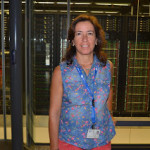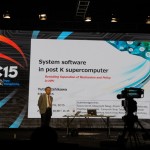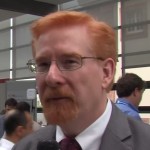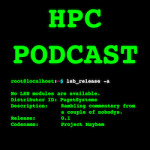In this video, Rich Brueckner from insideHPC moderates a panel discussion on Code Modernization. “SC15 luminary panelists reflect on collaboration with Intel and how building on hardware and software standards facilitates performance on parallel platforms with greater ease and productivity. By sharing their experiences modernizing code we hope to shed light on what you might see from modernizing your own code.”
Video: Superscalar Programming Models – Making Applications Platform Agnostic
Dr. Rosa Badia from BSC/CNS presented this Invited Talk at SC15. “StarSs (Star superscalar) is a task-based family of programming models that is based on the idea of writing sequential code which is executed in parallel at run-time taking into account the data dependencies between tasks. The talk will describe the evolution of this programming model and the different challenges that have been addressed in order to consider different underlying platforms from heterogeneous platforms used in HPC to distributed environments, such as federated clouds and mobile systems.”
Video: System Software in Post K Supercomputer
“The next flagship supercomputer in Japan, replacement of K supercomputer, is being designed toward general operation in 2020. Compute nodes, based on a manycore architecture, connected by a 6-D mesh/torus network is considered. A three level hierarchical storage system is taken into account. A heterogeneous operating system, Linux and a light-weight kernel, is designed to build suitable environments for applications. It can not be possible without codesign of applications that the system software is designed to make maximum utilization of compute and storage resources. “
Video: Fast and Robust Communications Avoiding Algorithms
“This talk will address one of the main challenges in high performance computing which is the increased cost of communication with respect to computation, where communication refers to data transferred either between processors or between different levels of memory hierarchy, including possibly NVMs. I will overview novel communication avoiding numerical methods and algorithms that reduce the communication to a minimum for operations that are at the heart of many calculations, in particular numerical linear algebra algorithms. Those algorithms range from iterative methods as used in numerical simulations to low rank matrix approximations as used in data analytics. I will also discuss the algorithm/architecture matching of those algorithms and their integration in several applications.”
Video: Reproducibility in High Performance Computing
Ensuring reliability and reproducibility in computational research raises unique challenges in the supercomputing context. Specialized architectures, extensive and customized software, and complex workflows all raise barriers to transparency, while established concepts such as validation, verification, and uncertainty quantification point ways forward. The topic has attracted national attention: President Obama’s July 2015 Executive Order, “Creating a National Strategic Computing Initiative,” includes accessibility and workflow capture as objectives; an XSEDE14 workshop released a report, “Standing Together for Reproducibility in Large-Scale Computing”; on May 5, 2015, ACM Transactions in Mathematical Software began the Replicated Computational Results Initiative; and this conference is host to a new workshop, “Numerical Reproducibility at Exascale,” to name but a few examples. In this context, I will outline a research agenda to establish reproducibility and reliability as a cornerstone of scientific computing.
Industry Experts Discuss Accelerating Science with Storage Systems Research
In this special guest feature, Ken Strandberg describes the highlights of panel discussion on high performance storage at SC15. “There was significant discussion about identifying the most important workflows, e.g. will checkpoint/restart continue to dominate I/O demands, difficult to analyze scientific datasets, or some new emerging science workflows. In identifying these workflows, we expect to learn where to focus storage research.”
Exascale Architectures: Evolution or Revolution?
In this special guest feature, Earl Joseph from IDC describes his SC15 panel where four HPC luminaries discussed, disputed, and divined the path to exascale computing. “As the panel wound to a close, participants agreed on one thing: the path to exascale contains significant obstacles, but they’re not insurmountable. Tremendous progress is being made in preparing codes for the next generations of systems, and sheer determination and innovation is running at an all-time high.”
HPC Podcast Looks at Intel’s Pending Distribution of Python
In this HPC Podcast, Don Kinhorn and Chris Stevens from Puget Systems discuss the boom in FPGAs at SC15 as well as Intel’s announcement that the company is going to maintain a build of Python. “Python is a pretty important programming language. It has a large and growing number of useful libraries for mathematical/scientific computing and machine learning, NumPy, SciPy, pandas, Scikit-learn, PySpark, theano, and more.”
Changes Afoot from the HPC Crystal Ball
In this special guest feature from Scientific Computing World, Andrew Jones from NAG looks ahead at what 2016 has in store for HPC and finds people, not technology, to be the most important issue. “A disconcertingly large proportion of the software used in computational science and engineering today was written for friendlier and less complex technology. An explosion of attention is needed to drag software into a state where it can effectively deliver science using future HPC platforms.”
Video: HPE Solutions for Data-Driven Organizations
“As a result of a new alliance with Intel, HP is offering its HPC Solutions Framework based on HP Apollo servers, which are specialized for HPC and now optimized to support industry- specific software applications from leading independent software vendors. These solutions will dramatically simplify the deployment of HPC for customers in industries such as oil and gas, life sciences and financial services. The HP Apollo product line integrates Intel’s technology innovation from its HPC scalable system framework, which helps to extend the resilience, reliability, power efficiency and price/performance of the HP Apollo solutions.”













